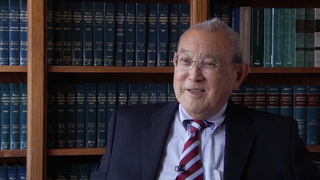Interviews
On Justice Todd’s Involvement with the Japanese American Cultural and Community Center
I left the board [of the Japanese American Cultural and Community Center] a few years ago. I just thought now…younger people and a new, you know, sort of new ideas and faces should be involved, but I was on the board for over twenty years, and…I became involved when—well, before I joined the board, I became involved down there because my former husband designed an exhibit—one of the earliest exhibits—which was of Isamu Noguchi lamps. And so we were down there—my daughter was just a little tiny tyke—and we were down there installing the show, and getting involved, and I knew the young man who was the head of the visual arts—Miles Kubo—at the time, and so I got involved down there. And I…I thought…I think, and continue to think, that it was very, very important for the community at large but particularly for my daughter—I wanted her to really have a sense of Japanese culture. And I think Japanese culture is rich and deep and broad, and I’m talking about traditional Japanese culture.
Date: July 10, 2012
Location: California, US
Interviewer: Lawrence Lan
Contributed by: Watase Media Arts Center, Japanese American National Museum; Japanese American Bar Association
Explore More Videos


Postwar school-life
(b. 1930) Half Japanese and grew up in both Japan and the United States.

Fifty Years and Going Strong
(1938-2020) Japanese American attorney and civil rights activist

Re-examining Identity
(1941-2018) Japanese Canadian photojournalist and activist

“I was never an exceptional student…”
(b. 1934) The First Japanese American Appointed to the U.S. Court of Appeals.

Being Denied as a Japanese American Lawyer
(b. 1934) The First Japanese American Appointed to the U.S. Court of Appeals.


The difference between Nikkei community in Oizumi and Brazil (Japanese)
(b. 1979) Sansei Nikkei Brazilian who lives in Oizumi-machi in Gunma prefecture. He runs his own design studio.



General reasons why people left Japan for Peru
Okinawan American whose parents are from Peru.

How she transitioned from anthropology to law
Sansei judge for the Superior Court of Los Angeles County in California

Changes in the Nikkei Community in Japan (Japanese)
(b. 1962) Nisei Japanese Argentinian, currently residing in Japan

Keirokai, the biggest celebration in the Cali Nikkei community
(b.1974) Japanese Colombian who currently resides in the United States

Cofounding the Asian Pacific Islander Law Student Association
(b. 1943) Japanese American transgender attorney
